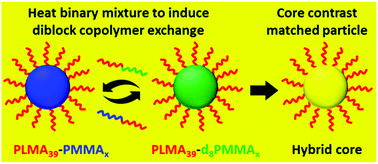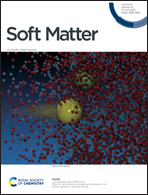Time-resolved small-angle neutron scattering studies of the thermally-induced exchange of copolymer chains between spherical diblock copolymer nanoparticles prepared via polymerization-induced self-assembly†
Abstract
Sterically-stabilized diblock copolymer nanoparticles (a.k.a. micelles) are prepared directly in non-polar media via polymerization-induced self-assembly (PISA). More specifically, a poly(lauryl methacrylate) chain transfer agent is chain-extended via reversible addition–fragmentation chain transfer (RAFT) dispersion polymerization of methyl methacrylate (MMA) to form sterically-stabilized spheres at 20% w/w solids in n-dodecane at 90 °C. Both fully hydrogenous (PLMA39–PMMA55 and PLMA39–PMMA94) and core-deuterated (PLMA39–d8PMMA57 and PLMA39–d8PMMA96) spherical nanoparticles with mean core diameters of approximately 20 nm were prepared using this protocol. After diluting each dispersion in turn to 1.0% w/w with n-dodecane, small-angle X-ray scattering studies confirmed essentially no change in spherical nanoparticle diameter after thermal annealing at 150 °C. Time-resolved small angle neutron scattering was used to examine whether copolymer chain exchange occurs between such nanoparticles at elevated temperatures. Copolymer chain exchange for a binary mixture of PLMA39–PMMA55 and PLMA39–d8PMMA57 nanoparticles produced hybrid (mixed) cores containing both PMMA55 and d8PMMA57 blocks within 3 min at 150 °C. In contrast, a binary mixture of PLMA39–PMMA94 and PLMA39–d8PMMA96 nanoparticles required 8 min at this temperature before no further reduction in neutron scattering intensity could be observed. These observations suggest that the rate of copolymer chain exchange depends on the degree of polymerization of the core-forming block. Relatively slow copolymer chain exchange was also observed at 80 °C, which is below the Tg of the core-forming PMMA block as determined by DSC studies. These observations confirm rapid exchange of individual copolymer chains between sterically-stabilized nanoparticles at elevated temperature. The implications of these findings are briefly discussed in the context of PISA, which is a powerful technique for the synthesis of sterically-stabilized nanoparticles.



 Please wait while we load your content...
Please wait while we load your content...